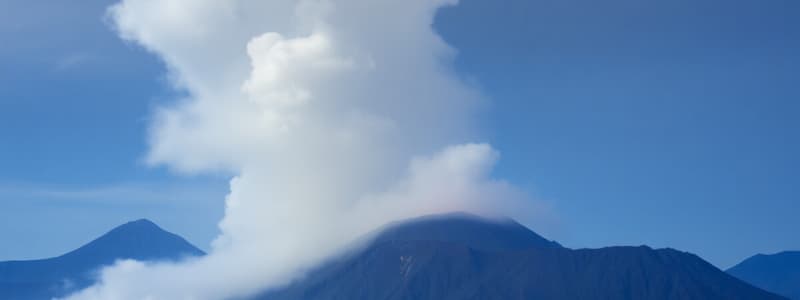Podcast
Questions and Answers
What is a volcano?
What is a volcano?
An opening in the Earth's crust that allows hot magma, ash, and gases to escape from below the surface.
Which term describes an area in the Pacific where volcanic and seismic activity is common?
Which term describes an area in the Pacific where volcanic and seismic activity is common?
- The Ring of Fire (correct)
- The Zone of Eruption
- The Belt of Fire
- The Circle of Lava
Most volcanoes are formed on land.
Most volcanoes are formed on land.
True (A)
How does magma rise to form a volcano?
How does magma rise to form a volcano?
The structure built from lava and/or tephra is called a ______.
The structure built from lava and/or tephra is called a ______.
What is a fissure in the context of a volcano?
What is a fissure in the context of a volcano?
What term is used for a bowl-shaped depression produced by volcanic activity?
What term is used for a bowl-shaped depression produced by volcanic activity?
What is a magma chamber?
What is a magma chamber?
A parasitic cone is a secondary volcano that does not share the same conduit to the magma chamber.
A parasitic cone is a secondary volcano that does not share the same conduit to the magma chamber.
Flashcards are hidden until you start studying
Study Notes
Volcanoes
- The word "volcano" comes from the Latin word "Vulcan," the Roman god of fire.
- Volcanoes are landforms that are either dormant, active, or dead.
- Volcanoes are openings in the Earth’s crust that allow hot magma, ash, and gases to escape from below the surface.
- Most volcanoes are formed on land, but some are found on the ocean floor.
- Volcanoes are common in the "Ring of Fire," a band of volcanoes circling the Pacific Ocean. This area experiences high levels of volcanic and seismic activity.
- 90% of the world's volcanoes are located in the Ring of Fire.
Formation of Volcanoes
- Magma, which is molten rock, is located deep beneath the Earth's surface, between 50 and 100 miles below.
- As magma rises, it melts through surrounding rock, creating gaps and paths toward the surface.
- As more magma rises, a large reservoir (magma chamber) forms, typically located about 2 miles below the surface.
- The pressure from surrounding rock forces magma to blast through a conduit (channel) to the surface.
- When magma erupts onto the surface, it is called lava.
- Lava builds up at the vent, creating a volcano.
Anatomy of a Volcano
- Crater: A bowl-shaped depression formed by volcanic activity, meteorite impact, or an explosion.
- Cone: The above-ground structure made of lava and/or tephra.
- Caldera: A large crater formed when the cone collapses into its magma chamber.
- Conduit: The pathway magma travels from the magma chamber to the vent.
- Magma chamber: The reservoir below the volcano where magma collects and supplies lava to build the volcano.
- Lava: Molten rock on the surface of the Earth.
- Parasitic cone: A smaller secondary volcano built on the side of or near the main volcano.
- Fumarole: A secondary vent that emits only gases.
- Fissure: A long crack from which lava flows.
- Vent: The opening of the volcano through which lava, ash, and gases flow.
Types of Volcanoes (Next Lesson)
- Different types of volcanoes categorized based on shape and activity.
Studying That Suits You
Use AI to generate personalized quizzes and flashcards to suit your learning preferences.




